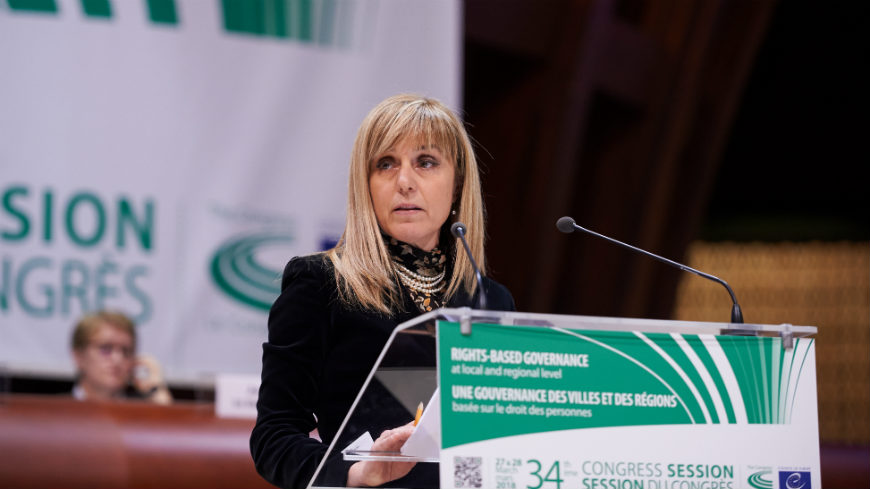Of a size closer to a local authority than a State, the Council of Europe's "smaller member States" are often models of local democracy. Even though, at first sight, certain aspects of the European Charter of Local Self-Government may not appear relevant to their specific characteristics, full application of this text is enabling them to enhance local democracy – that was the conclusion of the debate held on 28 March on the common challenges faced by smaller States in implementing the Charter.
Introducing the debate, constitutional law specialist and member of the Group of Independent Experts on the European Charter of Local Self-Government (GIE) Tania GROPPI pointed out the huge debt owed by today's local democracy to these "smaller States", whose political heritage has its origins in a distant past when local authorities were often the first line of defence against all-powerful princes or sovereigns, and that "the experience of local authorities as a counterweight is an example to be retained". Moreover, these countries are noteworthy for the diversity of their local political structures, with a quasi-federal organisation for Andorra, a status of city-State for Monaco and true decentralisation in the case of Liechtenstein, meaning that the proper application of the Charter is just as relevant for them as it is for any other Council of Europe member State.
Local democracies rooted in history and open to the future
While the Principality of Andorra has only 7 parishes or municipalities, spread over a territory of 468 km², the prerogatives of the mayors are broad and even include legislative initiative, explained the head of the Andorran government, Antoni MARTI PETIT. He saw Andorran local democracy as being rooted in history but that reality, like the size of the country itself, must not be an excuse for holding back from European standards: "Complying with the Charter, and indeed all the Council of Europe's texts, enables us to speak to all European countries as equals", he pointed out.
San Marino, the world's oldest republic and fitting into a territory of just 61 km², signed and ratified the Charter in 2013, while remaining a heavily centralised State: "Decentralisation would not be efficient" said its Minister of Internal Affairs, Guerrino ZANOTTI, pointing out for example that "just one civil status registry office is enough for the whole country". Even so, the "castelli", as the municipalities are known, have substantial powers of legislative initiative and "government close to the people is a reality in San Marino, where our two Captains Regent receive any citizen asking to see them", added Mr ZANOTTI.
For its part, the Republic of Malta largely reformed its local administration in 2017, drawing on the Charter's principles, as Silvio PARNIS, Maltese Parliamentary Secretary for Local Government and Communities, explained. Among other things, the reforms had focused on the training of local staff, the strengthening of local authorities and their administrative capacities, and the active participation of citizens in local government, and Mr PARNIS believed, had further boosted the quality of local democracy in Malta.
The question of the additional Protocol on the right to participate in the affairs of a local authority in the smaller States
Nevertheless, a number of Congress members were disappointed that most of the smaller member States had not ratified the additional Protocol to the European Charter of Local Self-Government or implemented certain Congress recommendations, regarding the status of capital cities for example. Beat HIRS (Switzerland, ILDG) wondered whether this situation was perhaps due to a fear of having to grant the right to vote to foreigners, which was actually unfounded as, in his view, "the Protocol does not stipulate it".
In reply to these questions, Antoni MARTI PETIT stressed that the approach taken by Andorra was a logical one, owing to the secular tradition of consultation of mayors by the national government. Where capital city status was concerned, he considered that since Andorra-la-Vieille already received more appropriations than the other parishes, though it was not the biggest city, drawing up such a status was unnecessary, and all the more so as it was "neither Paris nor Madrid".
Guerrino ZANOTTI took the view that San Marino "already applies the contents of the protocol on a day-to-day basis". Silvio PARNIS said that, after the monitoring exercise carried out by the Congress in 2017, Malta had not only signed and ratified the additional Protocol to the Charter but also taken other measures fostering the participation of citizens, including the lowering of the voting age to 16 for local elections, in which young people of that age could also now stand. Stewart DICKINSON (United Kingdom, ILDG) expressed delight at the announcement of the signature.
- Video of the debate
- Statement by Antoni Martí Petit, Head of Government of the Principality of Andorra
- Statement by Guerrino Zanotti, Minister of Internal Affairs, San Marino
- Statement by Silvio Parnis, Parliamentary Secretary for Local Government and Communities, Malta
** 34th Session of the Congress **
File 34th Session - Agenda – Videos and photos - Mediabox - Congress Mobile App - Twitter #COECongress




